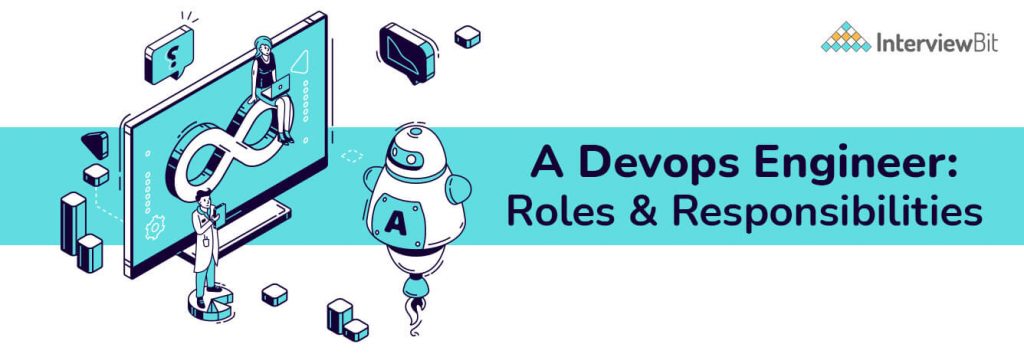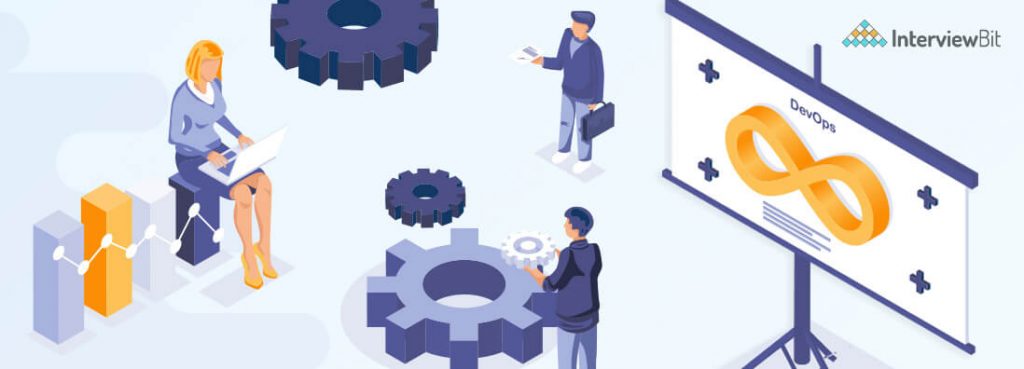- Who is a DevOps engineer?
- DevOps Engineer Responsibilities
- DevOps Engineer Skills
- 1. Strong hold on Linux fundamentals and scripting
- 2. Knowledge of various DevOps tools and technologies
- 3. Soft Skills
- Key Reasons to Become a DevOps Engineer
- 1. There are numerous opportunities in the profession –
- 2. DevOps: An evolving practice and an opportunity to learn new technologies –
- 3. Secure your career –
- 4. Impacting real businesses –
- 5. Great learning curve –
- 6. Compensation –
- DevOps Engineer Salary in India
- 1. Based on Experience
- 2. Based on Location
- 3. Based on Company
- 4. Based on the Skill Set
- DevOps Engineer Salary in other countries
- Conclusion
- Frequently Asked Questions
- Q.1: Is DevOps a good career?
- Q.2: Are DevOps Engineers paid more?
- Q.3: Can a fresher get a job in DevOps?
- Additional Resources
Who is a DevOps engineer?
A DevOps engineer is an IT professional who oversees code releases and deployments in collaboration with software developers, system operators (SysOps), and other production IT staff. From coding and deployment to maintenance and code updates, a DevOps engineer introduces processes, tools, and techniques to stabilize needs throughout the software development life cycle.

IT operations teams and development teams may have different skills and objectives. Developers want to add new features to an application, while operations teams want to ensure that it remains stable once it is released. It is a DevOps engineer who ensures that both the requirements of the developers and the operation teams are fulfilled.
Developers, system administrators, and programmers can be segmented in an agile environment, working on the same product but not sharing the information needed to provide value to the user. DevOps engineers simplify the process by bridging the gap between the actions required to quickly change an application and the tasks required to keep it reliable.
Confused about your next job?
Some companies may pay people to “perform DevOps” within their workflows, but because successful DevOps adoption requires changes in culture and method, this may only serve to exacerbate the gap between developers and operation teams. Thus, there must be an organized and structured workflow so that there is a sync between both the developers and the operation teams.
DevOps Engineer Responsibilities

A DevOps engineer must be able to manage the IT infrastructure that enables software code to run in dedicated, multi-tenant, or hybrid cloud environments. They may be required to provide resources, choose an acceptable deployment strategy, implement a testing procedure to validate each release, and track performance after it has been released. Test data preparation, results in analysis, problem debugging, and issue communication back to the software developers are all potential tasks of a DevOps engineer.
The DevOps method to software development aims for frequent, incremental code changes, which necessitate frequent deployment and testing schedules of the software. Despite the fact that DevOps engineers rarely write code from scratch, they must be knowledgeable with the fundamentals of software development languages and the development tools needed to write new code or update old code.
A DevOps engineer collaborates with development teams to complete the necessary coding and scripting to link various application elements, such as APIs, libraries, and software development kits (SDKs), as well as integrate other components, such as SQL data management or messaging tools, that DevOps teams require to run the software release on different operating systems and production infrastructure.
Because a DevOps engineer works on automation and maintenance in a live environment, employment roles emphasizing automation and maintenance of software products, systems, and services are widespread. A DevOps engineer, for example, would automate and maintain a big data build pipeline; provide on-call service for system availability; develop or source application and system management tools that reduce manual effort; enforce automated management features like performance monitoring, diagnostics, and failover and availability capabilities; develop software for monitoring of systems and assess risks for all changes while maintaining the main system.
DevOps Engineer Skills
Following are the skills that one must possess in order to pursue a career in DevOps engineering

1. Strong hold on Linux fundamentals and scripting
The majority of the companies prefer to run their apps on Linux. As a result, a DevOps Engineer’s ability to work with the Linux operating system is critical. As a result, a DevOps Engineer must be able to work with any scripting language and be proficient in at least one (preferably Python). As a result, Linux and Linux-based scripting would be an unavoidable DevOps skillset.
2. Knowledge of various DevOps tools and technologies
DevOps methods are carried out in stages, each with its own set of tools to aid the process. The main stages are as follows:
- Management of source code: Developers generate and change software codes on a regular basis. Source code management software is used to store code, integrate new code into existing code, manage code versions, and so on. One must be comfortable with any version control tool such as git.
- Management of Configuration: Software and operating system configurations are tracked via configuration management. It also aids in the management of thousands of server setups. It’s as simple as clicking a button or running a single command on the administration server. One must have good configuration management skills for it.
- Continuous Integration: The act of automating the code integrations from various developers into a single piece of software is known as continuous integration (CI). One must have the proper experience for this.
- Continuous Testing: Continuous testing is the technique of minimising the time it takes to receive feedback after a code test. Automation testing tools are used to test the code in the development environment. One must be familiar with the various automation tools used for testing.
- Continuous monitoring: Continuous monitoring is used to keep track of things like application performance, downtime, and error logs. Nagios, Zabbix, Splunk, and other tools are commonly used. One must have some experience in these tools so as to perform continuous monitoring.
- Containerization: Containerization is the virtualization of an operating system such that multiple containers running different programs can use the same operating system and resources. One must be well-versed in the concept of containers and the various containers used in the industry such as Kubernetes and so on.
Excellent technical knowledge of cloud infrastructure technologies such as Azure and AWS, among others.
Coding skills and experience with Software-Defined Data Centers are required. One must also have good problem-solving skills and a firm knowledge of Data Structures and Algorithms.
Expertise in node management and troubleshooting application services and server/network issues.
3. Soft Skills
With the adoption of the DevOps paradigm, soft skills are becoming increasingly important in the IT business. Most businesses choose an Agile approach based on DevOps principles, which allows teams to work at a high rate and generate deliverables quickly in order to fulfill customer expectations.
Key Reasons to Become a DevOps Engineer
Following are some of the key reasons that are pros of having a career in DevOps:-
1. There are numerous opportunities in the profession –
With the widespread skills needed in the DevOps recruiting market and hundreds of positions requiring DevOps or platform engineering experience, choosing a DevOps career opens up a world of possibilities. As a DevOps Engineer, you have the option of working for any organization in the IT industry. Start-ups in the industry are eager to implement a DevOps model right now, and consultants and large technology multinationals are hiring additional DevOps Engineers to supplement their existing tech teams.
2. DevOps: An evolving practice and an opportunity to learn new technologies –
DevOps is a relatively new methodology, therefore it’s prone to ongoing developments and improvements, making it an exciting moment to join the field.
DevOps is a concept that is still in its early stages of development in the technical world. As a result, it’s vulnerable to continuous development as new tools and technologies arise all the time, enhancing its ability to perform even more dynamically as an organizational function.
DevOps is being transformed by disruptive technologies including automation, microservice design, and serverless technologies. DevSecOps is a step forward in terms of achieving a seamless collaboration between IT operations and security. With the sector currently buzzing, now is an excellent moment to break into a DevOps Engineer career.
3. Secure your career –
DevOps is a technology culture shift that combines development abilities with interpersonal skills, critical thinking, and a drive to make a positive difference. You can cooperate with many teams and have a broad vision of the business if you have both technical and soft abilities. DevOps’ integrative, cross-functional culture will define the technology landscape in the future, therefore pursuing a DevOps Engineer position will provide you with a diverse skillset that will help you advance your career. More specialized senior-level positions are projected to be developed in the next five years as DevOps continues to revolutionize current corporate technology, with wide-scale adoption of DevOps expected across the sector. As firms invest in a DevOps department, this means there is plenty of room for internal advancement.
4. Impacting real businesses –
One of the key motivators for DevOps Engineers is the opportunity to provide real-world business results. DevOps breaks down boundaries across formerly segregated organizational departments such as product, engineering, security, quality assurance, and operations. This enables you to maintain a sharp business focus while delivering high-volume applications and services. There aren’t many jobs where you can have such a significant impact on a company. You can describe exactly how your activities have enhanced and expedited software quality and delivery because you have such a key, all-encompassing position.
5. Great learning curve –
A DevOps profession allows you to use a diverse range of talents that you are continually honing as a result of the new issues you face on a daily basis. It’s an endlessly fascinating profession that encompasses a wide range of tasks. As part of the infinite DevOps process from build to release, you’re always learning new
technologies and expanding your knowledge to enable faster deployment of higher-quality software.
6. Compensation –
In terms of flexibility and compensation, DevOps Engineers have some of the best opportunities in IT. Due to the fact that the overseas companies are in a different time zone, there has been an increase in the number of overseas organizations, particularly in the United States, employing DevOps Engineers stationed in the United Kingdom who can do application development and operational support outside of work hours. As a result, professionals can benefit from the flexibility of remote work while earning a higher wage in the United States.
DevOps Engineer Salary in India
1. Based on Experience
Your salary package will be larger if you have more experience. As a result, if you’re a newcomer to the sector, you’ll need to temper your expectations properly. So, let’s look at how much a DevOps engineer makes in India, based on how many years of experience you have.
Entry-level Salary – In India, the average entry-level DevOps pay is INR 366,337 per year.

Mid-level Salary – In India, the average mid-level DevOps pay is INR 1,142,206 per year.

Experienced level Salary – In India, the average experienced DevOps pay is INR 1,632,155 per year.

The following graph shows the variation of salary per year with the number of years of experience a person has.

2. Based on Location
In India, geography is a major element in deciding DevOps pay. Gurgaon, Haryana, India’s Silicon Valley, has the highest earnings, with DevOps engineers there earning almost 20% more than their counterparts in other locations. The national average is used to make the comparison. The second city fighting for the title of Silicon Valley is Chennai, Tamil Nadu, which offers incomes that are 9% lower than the national average. The following table illustrates the pay difference by location when compared to the national average :
| Location | Pay difference |
|---|---|
| Gurgaon, Haryana | +20% |
| Noida, Uttar Pradesh | +19% |
| Bangalore, Karnataka | +9% |
| Pune, Maharashtra | +6% |
| Mumbai, Maharashtra | -1% |
| Chennai, Tamil Nadu | -9% |
| Hyderabad, Andhra Pradesh | -10% |
Here, + denotes the salary is higher than the national average while – denotes that the salary is lower than the national average.
3. Based on Company
It is a well-known fact that the larger the brand or firm, the greater the compensation a person can anticipate. Let’s take a look at some of the highest-paying jobs: Tata Consultancy Services Limited pays over Rs. 6,27,000 per year in remuneration. Accenture Technology Solutions comes in second with Rs 5,63,000 per year in remuneration.
The following table illustrates the average pay of a DevOps Engineer in the various companies in India :
| Company | Salary (per year) |
|---|---|
| Tata Consultancy Services Limited | INR 6,27,000 |
| Accenture Technology Solutions | INR 5,63,000 |
| Amazon | INR 10,00,000 |
| Cognizant | INR 8,20,000 |
| Infosys | INR 5,78,000 |
| Amdocs | INR 7,20,000 |
| IBM India Private Limited | INR 8,00,000 |
4. Based on the Skill Set
Let’s look at how the salary of a DevOps engineer in India rises as their skill set grows. As previously stated, in order to obtain the best-paying jobs in the extremely competitive market for DevOps engineers, you must possess an exceptional set of talents. Some abilities enable you to earn a greater salary. As a result, make an effort to invest in these abilities.
- Having proper knowledge of Development Operations can fetch you a job with an average salary of INR 6,94,000 per year.
- Having proper knowledge of Amazon Web Services can fetch you a job with an average salary of INR 6,83,000 per year.
- Having additional knowledge of Linux can fetch you a job with an average salary of INR 6,71,000 per year.
- Having a proper knowledge of Python can fetch you a job with an average salary of INR 7,23,000 per year.
- Having a proper knowledge of Jenkins can fetch you a job with an average salary of INR 6,92,000 per year.
DevOps Engineer Salary in other countries
Following are the salaries for a DevOps Engineer in different countries :
Entry level experience
| Country | Salary per annum |
|---|---|
| India | INR 3,52,233 |
| United Kingdom | £ 29,598 |
| United States of America | $ 72,966 |
| Canada | CAD 61,191 |
Mid-level Experience
| Country | Salary per annum |
|---|---|
| India | INR 10,47,567 |
| United Kingdom | £ 48,561 |
| United States of America | $ 100,576 |
| Canada | CAD 82,277 |
Experienced level Experience
| Country | Salary per annum |
|---|---|
| India | INR 16,12,255 |
| United Kingdom | £ 60,629 |
| United States of America | $ 1,17,161 |
| Canada | CAD 89,198 |
The following table illustrates the minimum and the maximum salary that one can expect in various countries :
| Country | Minimum Salary per annum | Maximum Salary per annum |
|---|---|---|
| India | INR 3,07,000 | INR 20,00,000 |
| United Kingdom | £ 26,000 | £ 67,000 |
| United States of America | $ 63,000 | $ 1,34,000 |
| Canada | CAD 55,000 | CAD 99,000 |
The following table illustrates the top companies in the United Kingdom along with their salaries for the role of DevOps Engineer
| Company | Salary per annum |
|---|---|
| Accenture | £ 33,198 |
| ClearScore | £ 55,827 |
| KPMG | £ 58,575 |
| Sky | £ 44,642 |
| CloudReach | £ 35,222 |
The following table illustrates the top companies in the United States along with their salaries for the role of DevOps Engineer
| Company | Salary per annum |
|---|---|
| Accenture | $ 1,07,086 |
| Amazon | $ 1,10,779 |
| IBM | $ 1,12,432 |
| Cognizant | $ 96,381 |
| Capital One | $ 1,00,344 |
Read More – Highest Paid Jobs In India
Conclusion

DevOps is the future. Many businesses have realized the benefits and are implementing or preparing to implement this development mindset. A DevOps Engineer possesses testing, constructing, integrating, coding, and deployment talents, as well as problem-solving abilities. In order to validate your classification as a DevOps Engineer, you must also be able to multitask and deal with issues that occur from numerous responsibilities. To fully appreciate the benefits of DevOps, it is recommended that you enrol in a reputable DevOps training course and get DevOps certified. As a DevOps Engineer, you have the skills and expertise to advance to a rewarding career with respectable pay. In India, the need for DevOps Developers is currently at an all-time high.
Frequently Asked Questions
Q.1: Is DevOps a good career?
Ans: Yes, DevOps is absolutely a good career. DevOps positions are in high demand. According to a recent CodeInGame study of 15,000 developers and HR professionals, the most in-demand developer job title for 2021 is “DevOps Engineer.”
In addition, according to the same report, 43% of hiring managers are having trouble filling DevOps positions. DevOps jobs are well compensated. There is a lot of room for advancement in your career. Starting as a junior DevOps engineer, you’ll have many opportunities to advance to senior, manager, or architect positions. If you decide to change careers, many of the skills you’ll learn and the tools you’ll use will be transferable to more traditional operations or developer roles.
Q.2: Are DevOps Engineers paid more?
Ans. Yes, DevOps engineers are paid well. DevOps is one of the most commonly used words in the IT industry. DevOps helps an organization enhance its annual earnings, which leads to organizations looking for DevOps engineers. DevOps is concerned with enhancing the level of sufficiency. When you apply the practices and updates more regularly, you can simply interact with the applications, and all changes are confirmed as quickly as possible. As a result, errors that could jeopardize a company’s reputation are decreased.
Q.3: Can a fresher get a job in DevOps?
Ans. Yes, even a fresher can acquire a position in DevOps with adequate training, however, it can be challenging without proper training and no projects on your résumé. You can work as a software developer or an AWS architect before becoming a DevOps engineer. Working in those positions allows you to gain insight and expertise in DevOps approaches, and then you can simply apply for and get a DevOps role.




